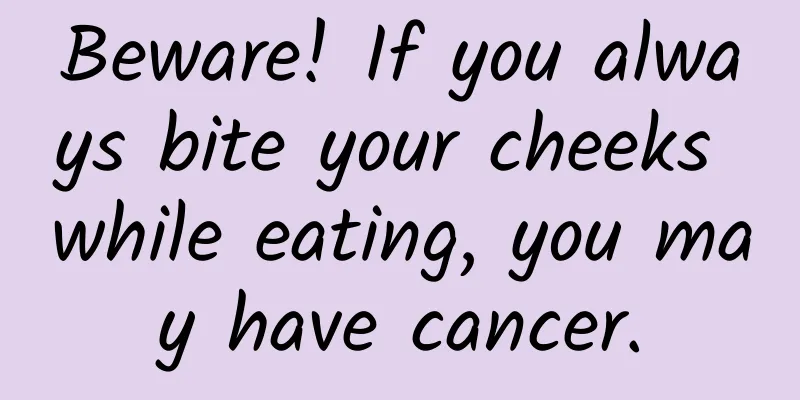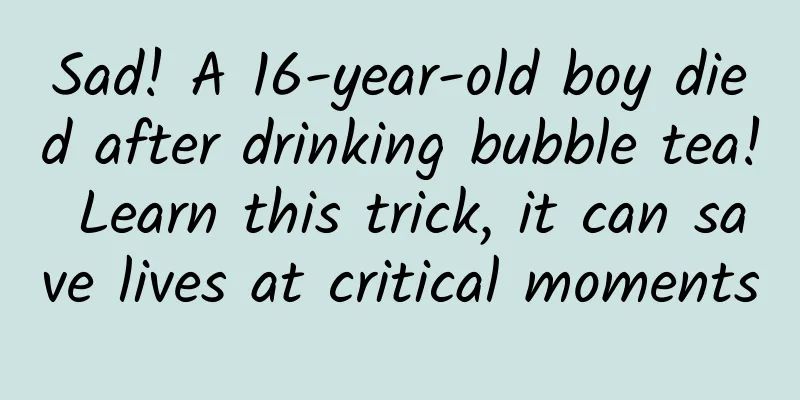Beware! If you always bite your cheeks while eating, you may have cancer.

|
If I'm not mistaken, I believe you have had such an experience. While eating, I accidentally bit my cheek several times in a row. In serious cases, it even caused bleeding. At this time, people around always say: "Are you craving for meat?" Old people also often say: "If you are greedy, bite your tongue; if you are thin, bite your cheeks." So, if you always bite your cheeks while eating, are you really greedy for meat? What should you do after being bitten? Let's take a look... You always bite your cheeks when eating. Are you craving for meat? In fact, biting the cheek when eating has nothing to do with craving for meat . Teeth need to move when eating, and sometimes eating too fast and too anxiously, or talking while eating and not paying attention, you will occasionally bite the cheek next to your teeth, which is normal. But if you are bitten frequently, you should be alert as it may be related to the health problems mentioned below. 1. Diseases of the hard tissues of the teeth If the teeth, especially the back teeth, suffer from caries, large tooth defects, sharp tooth tips, residual crowns, residual roots, etc. , you may often bite your cheeks or scrape the cheek mucosa inside the wound. 2. Poor tooth shape or occlusion Under normal circumstances, the maxillary teeth should cover the outside of the mandibular teeth, but it is common for individual teeth to be cross-bite, or for the back teeth to be misaligned. If the tooth tip is too sharp at this time, it will bite the cheek mucosa . Some people's maxillary wisdom teeth grow outward toward the cheek , which may often scratch the buccal mucosa or bite the cheek, causing repeated traumatic ulcers in the area and causing pain. 3. Failure to get dentures in time or inappropriate dentures After teeth fall out, if you don't get dentures for a long time, your cheeks will lose the support of the teeth and sink inward. After getting dentures, you may bite your cheeks during the adaptation process. If too many teeth are missing, poor restorations are used, or the coverage of the denture is too small , the bite disorder will occur and the cheek biting phenomenon is likely to occur. If a malocclusion is not corrected in time, it can cause problems with the temporomandibular joint (hook) , and cheek biting may become more serious. 4. Bad chewing habits or nighttime teeth grinding Some people like to chew on one side , so they have a lot of flesh on their cheeks. The more frequently they chew, the more developed the muscles on their cheeks become. Over time, the unused cheek becomes asymmetrical with the frequently used side, with one side larger and the other smaller, making it easy for people to bite the flesh on their cheek when eating. When you grind your teeth or clench your teeth at night, the sharp edges of your teeth may bite your cheeks and cause pain . 5. Transient brain hypoxia The movement of teeth is controlled by the brain . If the brain wants to work normally, it must have adequate blood supply and oxygen. If the brain experiences a temporary lack of oxygen , the nerves will suddenly stop and the tongue's reaction will slow down . If you are not careful, you may bite your tongue or cheek when your teeth close. 6. Mental factors Habitual cheek biting may also be related to psychological factors . Some people need to find ways to relieve anxiety, tension, and stress in life. At this time, it is easy for them to develop the habit of biting their fingers, hard objects, cheeks , etc. 7. Precursor of cerebral infarction If the elderly often bite their cheeks or tongues while eating, it may be a precursor to cerebral infarction, especially for those suffering from hypertension, hyperlipidemia, and diabetes . Because cerebral infarction can compress the brain nerves and make the mouth unable to move flexibly , the onset of the disease is often accompanied by symptoms such as slow swallowing, drooling, and unconsciously dropping the bowl when holding it. What is the impact? The most direct feeling of biting the cheek is pain . Frequent cheek biting will not only cause oral ulcers , but may also lead to hyperplasia of oral mucosal tissue in the corresponding area, and may even cause scarring and erosion . If there are white, smooth scaly patches or red patches, ulcers, or cauliflower-like tissue in your mouth that do not heal for a long time, it is recommended that you go to the hospital for a biopsy and pay attention to whether there is a risk of oral cancer . What to do after being bitten? 1. Don’t worry too much if you bite your cheek occasionally , the wound will heal slowly. Just be careful not to bite the swollen area repeatedly when eating . If traumatic oral ulcers are caused, you can spray watermelon frost spray on the affected area, pay attention to disinfection and cleaning, rinse your mouth frequently, maintain oral hygiene, quit smoking and drinking, try to eat light, warm and soft food, avoid spicy and irritating food, hard food, and hot food . Generally, the wound will gradually heal in about seven to ten days . 2.Dental hard tissue diseases You should go to the hospital's dental department for a dental check-up in time. If there are caries, pulpitis, apical periodontitis and other conditions, timely treatment should be carried out. If the residual roots and crowns can be retained, they should be repaired in time. If they cannot be retained, they should be removed as soon as possible and repaired at an appropriate time. 3. Misaligned teeth You should go to the orthodontic department of the hospital for examination and treatment to align your teeth and avoid frequent cheek biting. If you have wisdom teeth that grow outwards , it is best to remove them as soon as possible . 4. Denture discomfort You should go to the hospital's restorative department for examination and treatment as soon as possible, especially if you have dentures in the posterior teeth area, you should see a doctor for examination and adjustment. Remember not to adjust the teeth by yourself or have them placed in irregular places , otherwise it may aggravate the symptoms or cause other discomfort. 5. Chewing on one side Correct the long-term habit of unilateral chewing and learn to eat with both posterior teeth simultaneously or alternately . 6. Grinding teeth at night You can go to the hospital for examination and make a teeth grinding pad to relieve the symptoms. 7. Psychological factors If there are obvious psychological symptoms such as depression, tension, etc., you should go to the corresponding department for treatment in time. 8. Cerebral infarction If middle-aged and elderly people bite their cheeks frequently, it is likely a cardiovascular problem. Go to the hospital in time to find out the cause and pay enough attention to it. |
<<: What is the relationship between Qiantang River and Zhejiang?
>>: Complete success! Key technology breakthroughs
Recommend
How much does it cost to make a shoe and boots mini program in Yueyang?
How much is the quotation for shoe and boot manuf...
How much does it cost to make a wine utensils mini program in Bayanzhuoer?
There is no doubt that the topic of mini programs...
How to conduct refined operations based on the user life cycle?
According to the user life cycle, users can be di...
Luxury cars have quality problems again. Why is Lexus frequently recalling them?
Recently, the General Administration of Quality S...
Qingyu Community "Pinduoduo VIP Member Series" Super Detailed Pinduoduo Practical Operation Strategy
The content of this training course includes 8 sh...
More than 100,000 followers in 4 days, let’s talk about user fission growth!
One year and several months of practical experien...
Google, BlackBerry team up to make Android devices more secure
BlackBerry has announced a partnership with Googl...
360 Children's Watch 3S Preview: A Positioning Device for Children's Wrists
While you are still considering whether to buy a ...
Wildfires spread across Hollywood, but the pictures you see may be generated by AI | Environmental Trumpet
Hello everyone, this is the 25th issue of the Env...
Sharks don't ride horses, but they can actually walk! | Nature Trumpet
Welcome to the 16th issue of the Nature Trumpet c...
4 common misunderstandings about information flow creativity, skip the conversion and double it immediately!
We all know what the role of creativity is - to a...
Tips for writing Douyin scripts
TikTok short video sales have become a new force ...
The small Antarctic krill is actually a "gold mine" in the sea?
Under the Antarctic glaciers, there are rich and ...
How much does it cost to be an agent of Nanyang Photo Mini Program? What is the price of being an agent for Nanyang Photo Mini Program?
Is it easy to be an agent of Nanyang Photo Mini P...
Swift version of infinite loop carousel
Source code introduction: ***Circular carousel GL...









